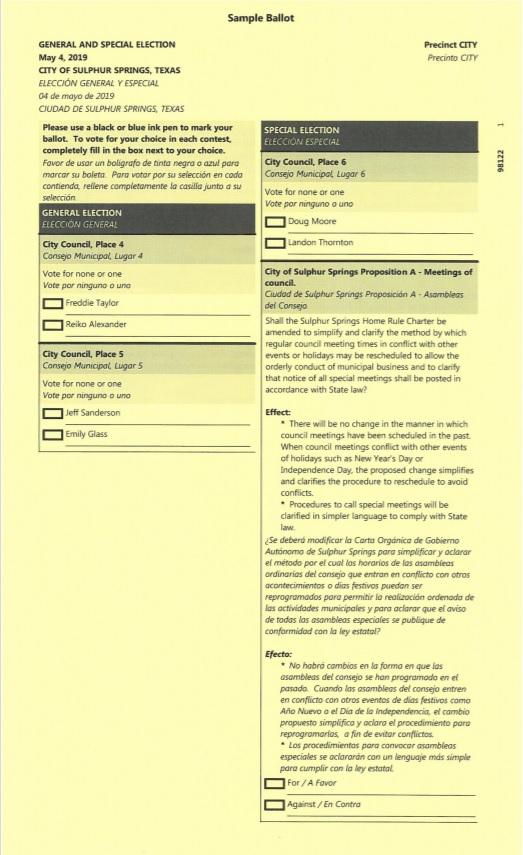Sulphur Springs voters will be asked, when casting ballots, to consider granting approval to 13 propositions for changes to the Sulphur Springs Home Rule Charter.
Essentially, the propositions allow for the language to be updated to reflect changes to state law, which the city follows, clarify a few points, designate a time by which a committee must review the charter for updates and plan for the future, City Attorney Jim McLeroy explained.
McLeroy explained the city charter hasn’t been updated since the early 1980s and not substantially for even longer.
“State laws have changed. We can no longer do as in the charter. We have to follow state law. This updates language with state law, mandates. We will continue to comply with state law,” McLeroy said.
In most cases,the propositions will mean no change to the way the city and council runs; it it will just update the charter to reflect current practices according to state laws, according to the city attorney.
McLeroy recommends any voter who is unfamiliar with the propositions or doesn’t understand the proposal to read the “effect” section on the ballot, which explains the impact of the charter change, before casting a ballot.

The propositions are at the recommendation of a Charter Review Committee, chaired by McLeroy, a couple of other city council members, and nominations made and approved by the city council. McLeroy described the approximately 12 member group as diverse, representing all walks of life, ages and areas of the city.
The group met several times, going through two to three sections of the charter per meeting, then proposed the recommended changes based on a consensus from the committee, according to McLeroy.
The city attorney took time to go over the propositions, to help voters better understand them.
Proposition A — Meetings of Council would allow the city council to continue meeting as usual on the first Tuesday of each month, unless the meeting falls on a holiday such as New Year’s Day or Independence Day. The meeting would then be scheduled to a different date to avoid the conflict. The change clarifies in the charter the procedure for rescheduling council meetings or calling special meetings in simpler language so the charter complies with state law.
Proposition B — Passage of Ordinances and Resolutions would change where notices of proposed ordinances are published. Instead of being published once weekly for three weeks in the newspaper, the full text of a proposed ordinance would be posted continuously on the city’s website. This would make it accessible continuously to more people online, according to the city attorney.
“The way ordinances are adopted would be the same. What would change is publishing in the newspaper,” McLeroy said.
Proposed ordinances or resolutions would still be read twice at the council meetings, and the emergency procedures would be updated to reflect current practices based on state law.
Proposition C — Municipal Election Dates and Procedures would not change current practices, but update outdated language in the charter, to note that all municipal elections are held according to state law, according to McLeroy.
Proposition D — City Manager would allow the city manager to be paid on the same schedule as other city employees. Currently, all city employees are paid twice a month except the city manager, who is paid once a month because of the charter. This would be an efficiency and cost saving measure for the city and would put the city manger on the same pay schedule as other employees, eliminating the need for two sets of books, the city attorney explained.
The city has not had to seek a new manager for about 25 years. However, Proposition D would also put the city in a better position to attract top talent at a competitive rate if at some point in the future a new manager is sought, McLeroy explained.
Proposition E — Finance Department would update the charter to the current structure, in which the city manger is not the finance director. The city manager appoints the finance director, provided the council approves the appointment. The duties of the finance director in collecting taxes according to state law will be more simply defined in the charge, if the proposition is approved.
Proposition F — City Budget wouldn‘t change the current practice of setting the budget, just where it is published on first reading. As is the case with notices, the proposed budget would be posted on the city website, and adopted in September, according to state law.
Proposition G — Emergency Appropriations would repeal a section of the charter so that the city is in compliance with state law limits regarding emergency appropriations, if needed.
Proposition H — Depository would not change any current practices, just update the charter to reflect changes in the Public Funds Investment Act, the city attorney explained.
Proposition I — Taxation also would not change current practices of the city, but update the language to reflect state law. It does not mean a change in taxes, just clarifies and removes outdated provisions, according to the city attorney.
Proposition J — Annual Audit again would amend the charter to reflect how the annual city audit is published. It would continue to be published on the city website, and would no longer be published in the newspaper.
Proposition K — Franchises would still make all franchise agreements available as public records on request at the city. Agreements would just no longer be published in the newspaper. While franchise agreements are reached about once every quarter century, McLeroy explained, the change could allow the city to enter into franchise agreements to provide necessary services for residents.
Proposition L — Non-substantive Revisions would allow the city to update the charter to reflect any legislative decisions impacting city operations moving forward as well as correct any grammatical errors or update language to modern terms, and things of that nature, as needed, if any are identified.
Proposition M — Charter Review would require the city council to appoint a Charter Review Committee to revise the charter at least as often as every 10 years, with any significant proposed charter changes submitted to voters, as are the 13 propositions on the May 4 ballot. In the past, numerous decades passed without substantive reviews or updating of the charter; this measure would help keep it current, according to the city attorney.








